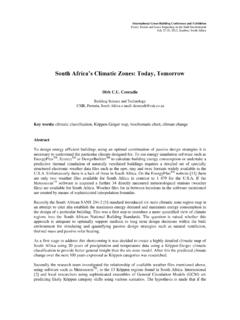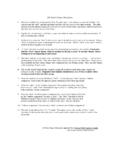Transcription of Document #5401 Hospital Outpatient 1206(d) Clinics—Legal ...
1 Document #5401. Hospital Outpatient 1206(d) Clinics Legal Considerations Impacting Physicians CMA Legal Counsel, January 2016. California hospitals are increasingly operating Outpatient clinics as a vehicle through which to recruit new physicians or to retain existing physicians, thus helping to develop, expand or preserve key medical programs. In certain settings, hospitals utilize these clinics as a pathway to help insure coverage of a service, including both primary care and surgical services. For example, hospitals have created ortho- pedic Outpatient clinics using this model. These clinics do not require separate licensure; they are exempt because they operate as Outpatient departments of the hospitals. This article focuses on key issues that present from the operation of these Outpatient Medical foundations are another mechanism used by (d) Clinics conducted, operated, or maintained hospitals to integrate with physician practices.
2 For as Outpatient departments of hospitals. more information, see CMA ON-CALL Document Importantly, the statute does not exempt hospitals or #0305, Legal and Practical Considerations Con- physicians from the corporate practice of medicine cerning Medical Foundations. prohibition (see Business & Professions Code 2400). Thus, hospitals may not employ physicians LEGAL AUTHORITY FOR to staff the clinics, retain their professional fees, or otherwise exercise dominion or control over the Hospital Outpatient manner in which professional services are rendered. CLINICS For more information, see CMA ON-CALL doc- Outpatient departments of a Hospital are exempt from ument #0200, Corporate Practice of Medicine Bar.. clinic licensure laws pursuant to Health & Safety Code Nor does the law exempt physicians from the anti- 1206(d). The broad language of the statute does not rebate and kickback laws (see Business & Professions specify or limit the type of Outpatient departments Code 650).
3 For more information, see CMA ON- that a Hospital may operate under their general CALL Document #1151, Prohibitions Against Kick- acute care licenses. Health & Safety Code 1206(d) backs and Fee-Splitting.. provides: 1. This ON-CALL was written by Anthony Hunter Schiff, , Mr. Schiff is a Professor (Adjunct) in the Department of Health Policy and Management, UCLA Fielding School of Public Health, and a partner in Schiff and Bernstein, APC, Los Angeles, California Medical Association 1995 2016. This CMA ON-CALL Document is brought to you through the support of our members, and the generous support of physician-sponsored professional liability companies, Medical Insurance Exchange of California, NORCAL Mutual Insurance Company, The Doctors Management Company, and the Cooperative of American Physicians. ATTRACTION OF The Bipartisan Budget Act of 2015 (the Act), Outpatient CLINIC enacted November 2, 2015, substantially alters how and how much Medicare pays for Outpatient services In the typical private practice setting, physicians are furnished in the Hospital setting.
4 Under Section 603. responsible for providing (and paying for) office space, of the Act, effective January 1, 2017, Medicare will equipment, furniture and furnishings, supplies, per- no longer pay for items or services furnished at an sonnel, billing and collection, and administrative off-campus Outpatient department of a Hospital pur- support (collectively, Facilities ). Under the Outpatient suant to the OPPS unless that off-campus location department model, the Hospital provides turnkey was billing as an Outpatient department of a Hospital clinic facilities for physicians, which, in turn, reduces prior to the date of enactment of the Act. Instead, the practice overhead significantly. Nonetheless, physi- Medicare would pay for such items or services under cians remain responsible to provide and pay for profes- the MPFS or ASC Fee Schedule, as applicable. sional liability insurance, billing and collection services, and individual benefits, , health insurance.
5 In larger For years, health policy experts have expressed con- practices, physicians typically still need to provide an cerns that Medicare should not pay different internal administrative infrastructure as well. amounts for the same Outpatient services based on location or type of provider. The same health policy experts also argue that the above referenced dispar- SITE NEUTRAL MEDICARE ities in payment create improper financial incentives PAYMENT (APPLICABLE for hospitals to acquire physician practices and ASCs TO NEW OFF CAMPUS to capture higher payments for furnishing the same Outpatient DEPARTMENTS) services. Section 603 of the Act begins to address the concerns about site-driven payment disparities and Medicare utilizes several different systems to pay for the behaviors they motivate. However, this section is the same Outpatient services furnished to Medicare much less comprehensive than alternative solutions beneficiaries, depending upon the site where such that could have been advanced.
6 Services were performed. In general, Medicare makes a single (or global) payment for physician services First, the Section 603 limitation applies only prospec- furnished to beneficiaries in the medical office setting tively, meaning any arrangement that is already billing pursuant to the Medicare Physician Fee Schedule as a Hospital Outpatient department service prior to the (MPFS). However, if the same services are furnished date of enactment of the Act can continue to bill and in the Outpatient department setting, then Medicare be paid by Medicare under the OPPS. Of course, the pays the physician a modified amount pursuant to Centers for Medicare and Medicaid Services (CMS), the MPFS and Medicare pays the Hospital a facility which is responsible for implementing Section 603 of fee pursuant to the Hospital Outpatient Prospective the Act, could in the future attempt to limit the Payment System (OPPS).
7 The sum of the amounts exemption by freezing the size and scope of the payable by Medicare for physician services furnished existing location. in the Outpatient department setting is typically higher than the single amount payable by Medicare Second, the Section 603 limitation applies only to for the same physician services furnished in the items and services furnished in an off-campus location. medical office setting. Under existing Medicare regulations (42 ) governing provider-based status, campus is Similarly, Medicare pays an ambulatory surgery center defined as the physical area immediately adjacent to (ASC) a facility fee pursuant to the Ambulatory Sur- the provider's main buildings, other areas and struc- gical Center Fee Schedule (ASC Fee Schedule). The tures that are not strictly contiguous to the main ASC Fee Schedule applies to surgery centers that are buildings but are located within 250 yards of the main only partially owned by hospitals.
8 Medicare utilizes the buildings, and other areas determined by CMS on a OPPS to pay a facility fee to a provider-based outpa- case-by-case basis. Consequently, this payment lim- tient surgery department of a Hospital . The facility fee itation technically applies only to those Hospital outpa- payable pursuant to the ASC Fee Schedule, like the tient department locations not meeting the definition MPFS schedule, is less than the fee payable pursuant of campus.. to the OPPS. 2. Finally, Section 603 does not apply to payments for setting, even when the physician includes the location items and services until January 1, 2017, even loca- modifier on the bill. As a result, the physician receives tions not billing as Hospital Outpatient departments a global fee from the commercial payer that includes as of the date of enactment. reimbursement for the Hospital -supplied Facilities. In addition, a similar billing issue presents when a BILLING AND surgeon receives a global surgical fee that includes THE POTENTIAL FOR both reimbursement for the surgery and for post- FALSE CLAIMS operative visits in the Outpatient clinic setting.
9 Under the Outpatient clinic model, Outpatient visits will typ- For each patient encounter in the Outpatient setting, ically occur in the Outpatient clinic setting in which the Hospital seeks to recover the cost of providing the the physician will utilize the Facilities. However, the Facilities by submitting a separate bill to the appli- facility fee received by the Hospital in connection cable third party payer. Correspondingly, the with the surgery (inpatient or Outpatient ) will not attending physician (or his or her group practice) include reimbursement for the Facilities supplied by submits a bill to the same payer with a location mod- the Hospital in connection with post-operative visits ifier to denote that the patient encounter occurred in in the clinic setting. an Outpatient facility. In theory, the Hospital should receive reimbursement from the payer for the cost of Importantly, the physician should not retain either the the Facilities.
10 In turn, the physician should receive a entire clinic-encounter global fee or surgical global fee, reduced fee from the payer for his or her professional even if the Hospital permits the physician to do so. services in recognition of the payment to the Hospital Instead, the physician should utilize a portion of the for the Facilities. And, in theory, the savings to the global fee to reimburse the Hospital for the Facilities. physician from not having to provide (and pay for) The failure of the physician to reimburse the hos- the Facilities should be greater than the aggregate pital and/or the unwillingness of the Hospital to reduction in fees occasioned by the application of the accept reimbursement from the physician for the location modifier in billing for professional services. Facilities could be construed as consideration paid by the Hospital to the physician in exchange of The Medicare program recognizes the billing patient referrals, a violation of federal and state dichotomy in the clinic setting.







